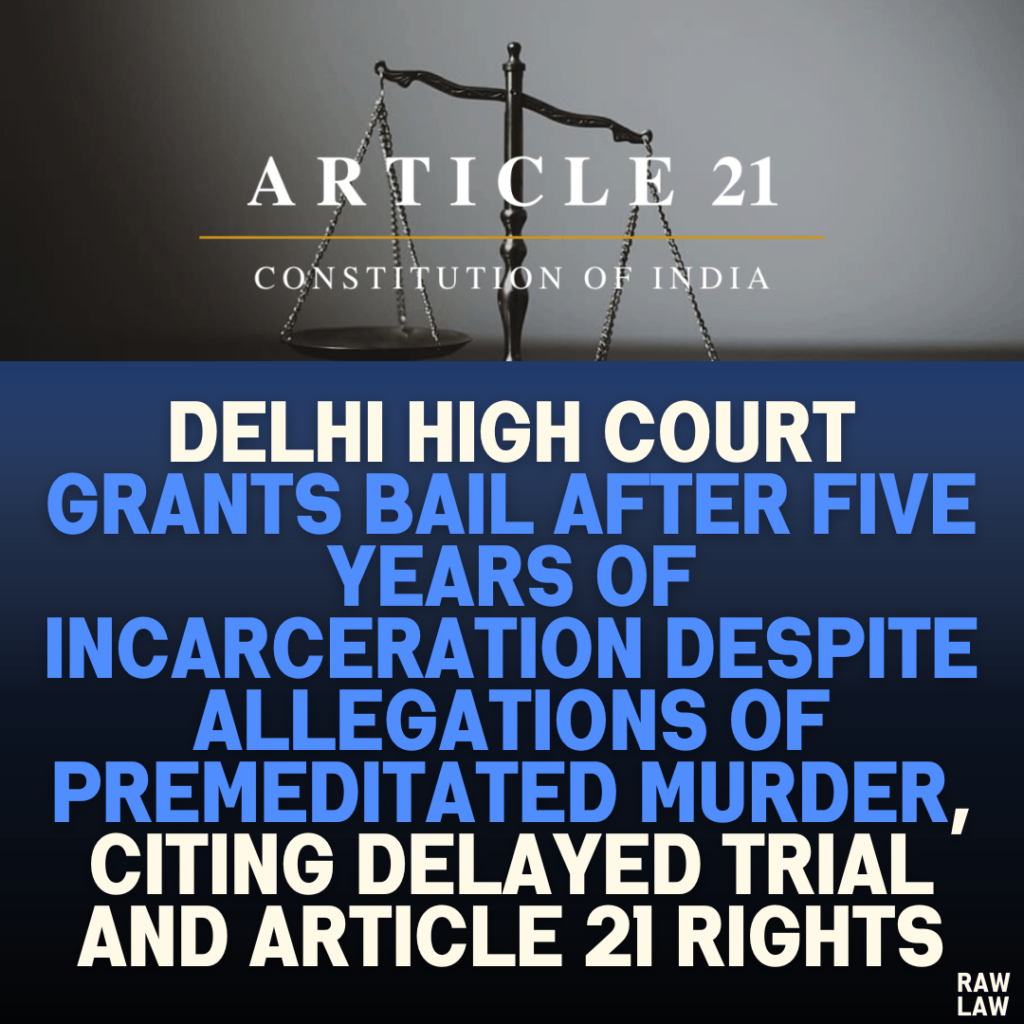Court’s Decision:
The Delhi High Court granted bail to the applicant accused of murder, citing prolonged incarceration of over five years and the delay in trial as a violation of the fundamental right to life and personal liberty under Article 21 of the Constitution. The court emphasized that “deprivation of liberty has been considered as a punishment” and observed that the trial was unlikely to conclude in the near future. The bail was granted with strict conditions to ensure the applicant’s cooperation in the trial and prevent any tampering with evidence.
Facts:
- The case pertains to an incident on January 6, 2019, where two individuals were shot dead on a public road.
- An FIR was registered under Sections 302/34 IPC and Sections 25/27 of the Arms Act after forensic evidence, including ballistic analysis, confirmed the involvement of weapons linked to the accused.
- The applicant was formally arrested on January 28, 2019, following a disclosure statement implicating him in the crime, which allegedly arose out of a family dispute.
Issues:
- Whether the applicant could be granted bail despite the severity of the charges and his alleged involvement in the crime.
- Whether prolonged incarceration and delayed trial justify the applicant’s release on bail.
Petitioner’s Arguments:
- The applicant asserted his innocence, claiming false implication and fabrication of evidence.
- Highlighted inconsistencies in eyewitness statements and the lack of conclusive evidence.
- Argued that his prolonged detention was unjustified, especially when the trial was far from completion.
Respondent’s Arguments:
- The State opposed the bail application, emphasizing the heinous nature of the crime and the applicant’s active involvement as confirmed by forensic and eyewitness evidence.
- Stressed that releasing the applicant could jeopardize the trial and risk witness intimidation.
Analysis of the Law:
The court reiterated principles governing bail, particularly in cases of prolonged detention. It referenced the Supreme Court’s ruling in Union of India v. K.A. Najeeb (AIR 2021 SC 712), which mandates granting bail where timely trial is unfeasible, provided appropriate safeguards are imposed.
Precedent Analysis:
The court referred to Prabhakar Tewari v. State of U.P. [(2020) 11 SCC 648], noting that criminal antecedents alone cannot be grounds for denying bail, emphasizing the necessity of balancing individual liberty with the interests of justice.
Court’s Reasoning:
- The applicant had been in custody for over five years, while only 10 out of 44 listed prosecution witnesses had been examined, indicating a significant delay in the trial process.
- The court found that continued detention without substantial progress in the trial contravened Article 21.
- Observed that bail conditions could mitigate concerns of tampering with evidence or evasion.
Conclusion:
The court allowed the bail application, directing the applicant to furnish a personal bond of ₹25,000 with two sureties of the like amount. Conditions included:
- Prohibition against leaving the country without court permission.
- Mandatory appearance before the trial court as directed.
- Provision of contact information and residence details to the investigating officer.
Implications:
This ruling underscores the judiciary’s commitment to safeguarding constitutional rights, even in serious criminal cases, while balancing the need to ensure justice. It emphasizes that delays in trial cannot serve as a justification for indefinite incarceration.




Pingback: Bombay High Court Upholds Retrospective GST Audits for Deregistered Entities: Deregistration Does Not Shield Compliance Obligations or Prevent Audits Under Section 65; ₹7.01 Crore Liability Highlighted - Raw Law